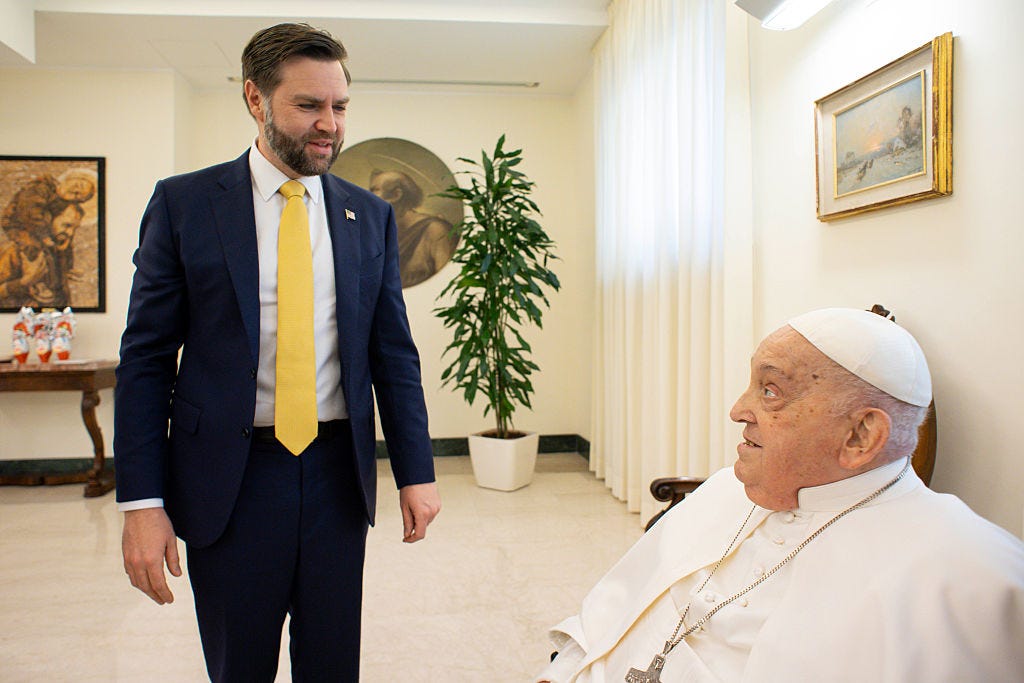Pope Francis — born Jorge Mario Bergoglio in Argentina and the first non-European pope — died early Easter Monday at age 88, just weeks after returning to work from a lengthy hospitalization for pneumonia. The progressive pontiff’s death comes at a tumultuous time for the Catholic Church and the world, and raises questions about the legacy of this very consequential leader and the future of the church he led for a dozen years.
Far-right Catholics, from Vice President JD Vance to longtime advisor Steve Bannon, are in ascendance in the U.S. and elsewhere, and play key roles in the motley coalition around President Trump. Bannon (who’s backed efforts to remake the church in a more conservative mode) has leveled “great replacement” charges against the church, suggesting during the first Trump term that American bishops supported DACA because “They need illegal aliens to fill the churches.” With Trump back in power, wider adoption of that criticism appears to have led the government to cut funding for the U.S. Conference of Catholic Bishops’ refugee aid efforts. Five Supreme Court justices are conservative Catholics. Parishes across the U.S. have turned away from Vatican II reforms to adopt “traditionalist” conservative practices.
Francis, on the other hand, tried to use the church’s tools and resources to make a better world, often against great odds. He appointed the first woman to run a Vatican office. He defended LGBTQ people, within and outside his faith. In an age of closing borders, he was an advocate for the rights of migrants. And he called, until the end, for a ceasefire in Gaza and was often a thorn in the side of right-wing leaders in the U.S. and around the world, warning of the dangers of populism and nationalism. As the representative of the Church’s doctrine, not all of his positions were progressive — he argued for extending the Church’s protections to women who have had abortions, but continued to condemn abortion itself. He had a mixed record on dealing with the ongoing problem of sexual abuse within the church, promising more than he delivered. And some conservative critics have suggested his reformist efforts may have strengthened the resurgent traditionalist forces within the church, undermining not just his programs, but papal authority and effectiveness.
While Francis was publicly dismissive of the left-wing liberation theology movement, he did find common cause with many liberals and leftists, given his intellectual bent (he was the first Jesuit to serve as Pope), his purist struggle to reform the Catholic Church into a “church that is poor and for the poor,” his critiques of the neoliberal order, and his support for action on climate change (he was reportedly instrumental in pushing many leaders towards signing the 2015 Paris Agreement). He became an unlikely progressive hero.
Some of you will have followed Francis’s running dispute with Vice President (and Catholic convert) JD Vance; the Pope singled out Vance’s limited interpretations of scripture for criticism on multiple occasions, continuing into this past Easter Week.
On Easter weekend, Francis first sent church deputies to meet with Vance (who was in Italy last week, for meetings with right-wing ally Prime Minister Giorgia Meloni). Francis did finally meet briefly with Vance on Easter Sunday. The in-person meetings were reportedly cordial, though Francis’s criticism of U.S. immigration policy was reportedly on the table, and the Pope did call out the Trump regime in his final Good Friday address:
Today’s builders of Babel tell us that there is no room for losers, and that those who fall along the way are losers. Theirs is the construction site of hell. God’s economy, on the other hand, does not kill, discard or crush. It is lowly, faithful to the earth.
Francis was the rare leader, spiritual or political, who appeared to have taken the Bible literally and seriously. That brings with it plenty of baggage, but his successors, his followers, and people with all manner of religious affiliations or lack of affiliations in the U.S. and everywhere else, could do worse than to emulate his example.
A programming note: More Live conversations this week
We’re back Live this week, with three special guests. Join us tomorrow, Tuesday, April 22, at 12:30 p.m. Eastern, when we’ll talk to the economist Dani Rodrik. And on Wednesday, April 23, at 1:00 p.m. Eastern, we’ll be speaking with the writer, lawyer, and former Secretary of Labor Robert Reich. And on Thursday, April 24, at 12:30 p.m. Eastern, we’ll be joined by labor leader Sara Nelson, president of the Association of Flight Attendants-CWA, AFL–CIO. You won’t want to miss any of these!
To join and watch, download the Substack app (click on the button below) and turn on notifications — you’ll get an alert that we’re live, and you can watch from your iOS or Android mobile device. And if you haven’t already, subscribe to The Ink to access full videos of past conversations and to join the chat during our live events.






Gratitude for your comments Anand- gentle, to-the-point and honest - the manner of support needed in this moment of sadness
Vance killed him for sure.